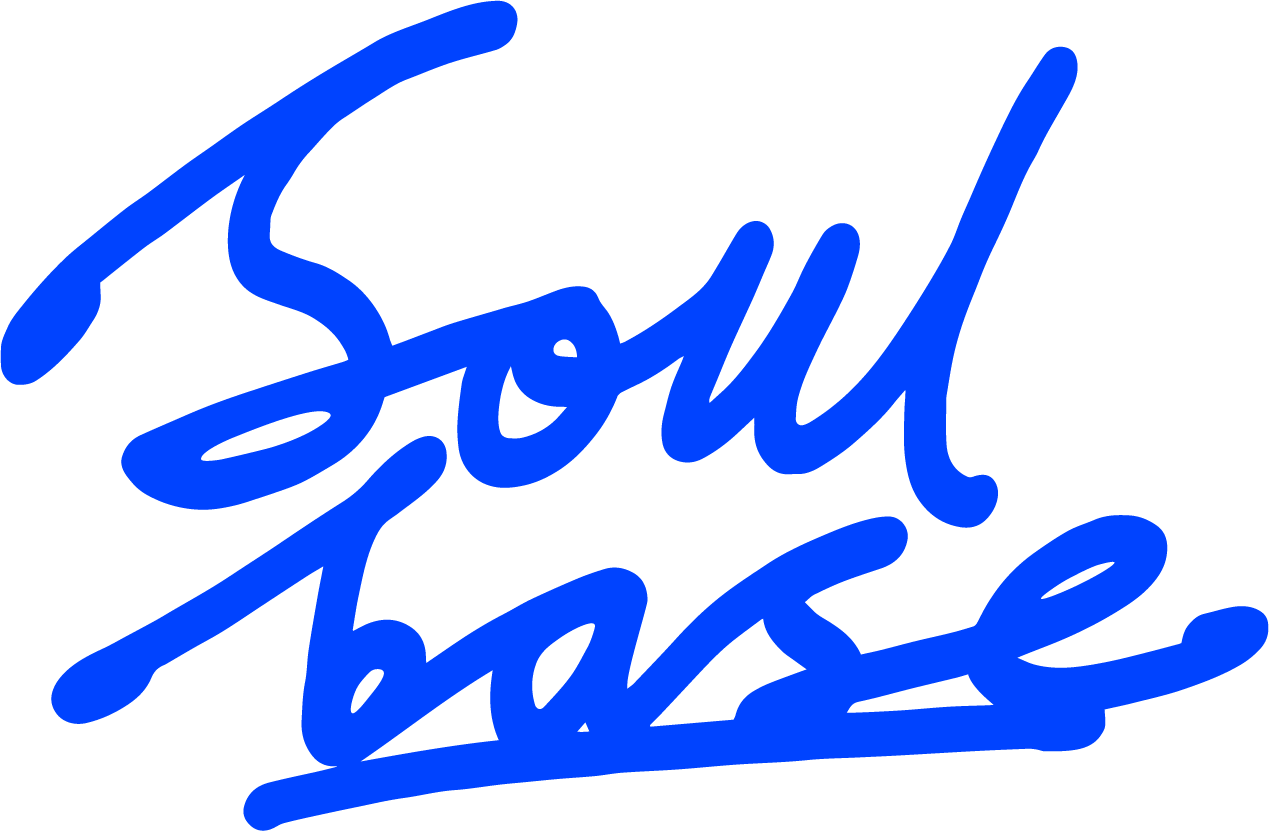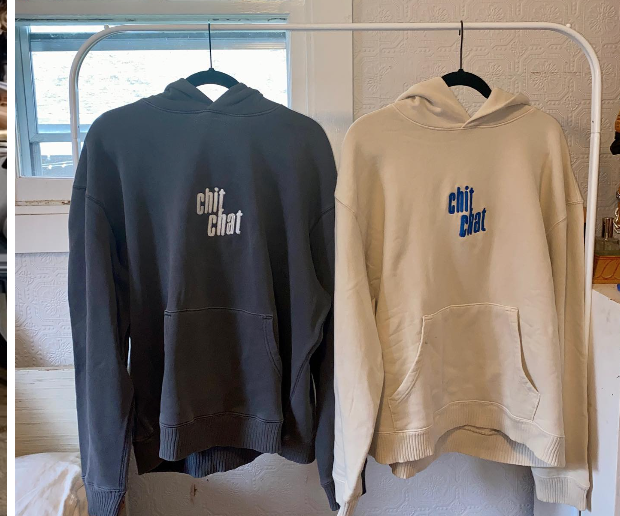SOULBASE Talk:
Alex Stone -
Face behind Soothefolk
Introducing Alex Stone, the creative force behind Soothe Folk, a textile artist and chain stitching shop based in Portland, Oregon. With a professional background that includes a career as a Levi's tailor, a stint in botany and forestry and a background in anthropology, Alex’s diverse experiences and love for learning come together in her multidisciplinary approach to art. From bespoke chain stitched projects to collaborations with local businesses, Alex's work reflects a fusion of craftsmanship in the dynamic setting of Portland, Oregon. In this interview, Alex shares what attracted her to the rare art of chain stitching, how it fits into her multidisciplinary approach and how creativity, compensation and collaboration manifest in her world.
What fascinates you about the chain stitching world?
So much! Perhaps, foremost, is the fact that it has a history in American textile economies. Back in the ‘50s and ‘60s, varsity apparel was all the rage, and there were tens of thousands of technicians – or chain stitch artists – whose full-time employment relied on their knowledge of the craft. Apparel ornamentation has existed as long as people have been making clothing, but in the 1950s, Nudie Cohn really brought that decorative appeal into the limelight. Beyond the history of the art, the surviving knowledge of how to identify, assemble and use the machines is very niche. There are likely only a few hundred people in the U.S. who now know how to operate these machines, and only a handful share their work with the public. Because the resource for that knowledge isn’t centralized or well-documented, you really have to become very technically adept at diagnosing problems with your machine to operate it correctly. Knowing that there are folks willing to carry on this knowledge is what really excites me.
What was your first apparel piece that you chain stitched? When did you sell your first chain stitched project?
Haha, I can’t even remember the first piece I stitched. The reason being it was horribly ugly! It took me months and months to understand stitch tension, so I had to make a lot of mistakes and ruin garments just to get to a point where I was ready to show the world what I could do. It takes most chainstitch embroidery artists years to go public with their craft. I took a bold plunge when I did my first popup after only three months of using the machine. I think I misspelled the word because I was so nervous, but within a short time, I’ve become much more confident. People all have different ways of getting to where they want to go. When did you know that you wanted to work full-time in the chain stitching field?
I knew as soon as my paycheck from events started outweighing my earnings from my part-time restaurant job. I mean, I guess I knew as soon as I went to art school. At that point, for me, going full-time wasn’t an option. But I was on track to become full-time, and I got there a little faster than anticipated. I’m incredibly grateful for that, but also for my own ambition and tireless efforts. I guess I knew it was a possibility as soon as I started following and talking to full-time chainstitchers online. Thank goodness for them!Can you share with us where you are based?
I’m based in Portland, OR. I work out of my home studio in North Portland in an old 2-bedroom house. My roommate is also an artist – a prinkmaker – and we share a space with industrial sewing machines, my embroidery machine, a printing press, a digital embroidery machine, a basement darkroom and a woodshop outside!I grew up in Sonoma, CA and relocated to Portland to pursue my master’s degree in Fine Art at Pacific Northwest College of Art three years ago. Have you always worked in the textile field?
No! In fact, I’ve had quite a meandering path in terms of my career. My background is in darkroom photography, but I transitioned to studying anthropology in undergrad. That major allowed me to explore so many intersections of humans, the environment and history. I’ve worked receptionist jobs, as a production assistant to a media company, then into botany and forestry, and thereafter, I became a fellow with Smithsonian Environmental Research Center, where I studied shipping history and oyster habitats. It was actually my mentor at the Smithsonian who gave me the idea of looking into Fibershed in California, and from there, my appetite for craft history grew and grew. How did you learn this craft?
After the Smithsonian, I went back to school to study Apparel Merchandising in Alameda, CA. With a few courses down, I got a job as a tailor at Levi’s. That’s where I first saw the chainstitch embroidery machine. It wasn’t until after two more years had passed and I completed my MFA that I bought my own and started practicing. Now, it’s an obsession.What does it mean for you to work creatively?
Ooh, hitting me with the hard questions! To work creatively means to have the space, ambition, support and motivation to express yourself freely. To collaborate through conversations, materials, mediums. It means to not have a boss, to make your own rules, but be open to other input and suggestions. And to have the ability to carry those conversations and ideas out into the world to share with others. What would be a dream project for you?
Making Nudie Suits for First Aid Kit, the band! And also to work with a larger company, like Adidas, on a custom line of chain stitched pieces. When you’re not working on projects or hosting popup events, where can we find you? What are your favorite places to recharge?
I have many, but right now, you can find me at Bastion Coffee, Wild Cactus Boutique, Heavenly Creatures or Bar Norman. My line is always open, so get in touch and invite me out to coffee :)Follow Alex Stone and Get your Own Customized Piece or book her for upcoming Events and more :@soothefolkwww.soothefolk.usYou offer your own products and also offer to create custom chainstitching. Can you tell us a little bit about both sides of your work?
There are so many sides to my work, but I’ll explain it the way I was taught in school. I’m a multidisciplinary artist who works in the field of textiles. I have a multi-pronged approach to my work. At my core, I am a maker – a busy-body who uses my hands to craft for money. But not all avenues within my discipline are necessarily my artistry. I think chainstitch is a way to make something beautiful and creative that corresponds with financial gain and notoriety, but the stuff that goes into the chain stitching, the ideas, the wall pieces, the soft sculpture environments – that’s the art. I don’t chainstitch just to make money; it just so happens that I’ve found chainstitch embroidery is the best way to compensate myself for the hours spent doing other creative activities. For now, I use chain stitching at events to make connections, to share the craft and to get more clients. My hope is to get to a point where I’m only doing private events, like weddings, and making custom suits for performers and other artists.You also offer to pop up at events and collaborate with local businesses. How do you feel like your business benefits from those popups and how do they benefit the other party?
That’s right! The small boutiques and local-owned businesses of Portland have given me an incredible opportunity to share my work. Without them, I wouldn’t be where I am today. I’ve formed special relationships with every single one of them, but I have to say, certain relationships have evolved into much deeper connections. OURstore Vintage was the first shop willing to take me under their wing and hosted me for a few events. The Yo! Store, Wild Cactus Boutique and Superette have all been incredible connections, who have introduced me to a world of other femme makers and artists and shared their clientele. Each event is like a collaboration – I get to make unique flash and work on their products. My hope is that my participation has also fostered a sense of community for them and allowed their customers to feel special and like the businesses care to share more creative and personalized offerings. I think in general, Portland business owners know that local makers are what make this city unique. They understand that we are all trying our best to say something special and to offer something that larger companies can’t. People want to feel that, beyond what they buy, they have a friend in their neighborhood and they have a place to return to and feel seen. At least that’s what I want.










